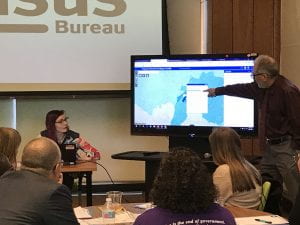
JMU Students in Democracy Matters examine hard-to-count precincts in Harrisonburg, VA during a trip to the U.S. Census Bureau on January 30, 2020.
The census is one of the most direct manifestations of democracy. The framers of the U.S. Constitution had a bold vision of a nation governed by the people and for the people that could only be realized if every person in the nation was represented. The power of the census lies in its ability to provide this representation through counting every person in the United States. An inaccurate census count could result in individuals losing their voice.
But the power of the census exists in more areas than just political representation. Accurate census data is a necessity not only for the lofty political vision of the framers of the Constitution, but for the every-day concrete needs of communities. Accurate census data leads to economic growth, improved community health and wellness, safer housing, improved educational systems, better access for individuals with disabilities, and funding of programs for low-income individuals and families.[1] This is because knowledge of the populations in certain communities is used for decisions such as where to plan new hospitals or schools, how to create more efficient paths for emergency vehicles, or where businesses should develop. These are the decisions that directly impact community members.
The importance of the census becomes even clearer when we consider populations that are hard-to-count, and have greater potential to be left out of the census, including college students, children, non-English speaking individuals, and individuals in rural areas. This is troubling because many of the community developments informed by the census are the developments that are critical to these populations. When a state determines where to build a new school, they need an accurate representation of the children that will be attending, and how many of those children are non-English speaking. When cities map out emergency vehicle routes, they need to know how to reach residents of rural areas as quickly as possible. When churches and nonprofit organizations supporting immigrants decide where to locate, they need to know the areas where they are most needed. These populations (rural, non-english speaking, and children) are already at a disadvantage for communicating their needs, and an inaccurate census count only serves to deepen this disadvantage. An accurate census count is essential to effectively meet the needs of these populations.
For college students, the census is particularly significant. Despite the fact that most students will only be living in their college town for four years, by filling out the census, they bring more funding to the area, contribute to the development of rural areas, encourage investment and innovation, and countless other benefits that will last beyond their time there.[2] An accurate representation of the Harrisonburg population through the census benefits not only college students but every resident in the area contributing to the community they enjoy.
The census, though a broad government tool, benefits individuals. To receive the benefits, individuals must participate. An accurate census in 2020 is crucial for thriving communities and for democracy.
[1] U.S. Census Bureau. (2020). Appendix A: 50 Ways Census Data Are Used.
[2] U.S. Census Bureau. (2020, January 13). In Student Housing, Off Campus or With Parents, College Students Count in 2020 Census. Retrieved from https://www.census.gov/library/stories/2020/01/student-housing-off-campus-with-parents-college-students-count-2020-census.html?utm_campaign=20200113msacos1ccstors&utm_medium=email&utm_source=govdelivery

Recent Comments